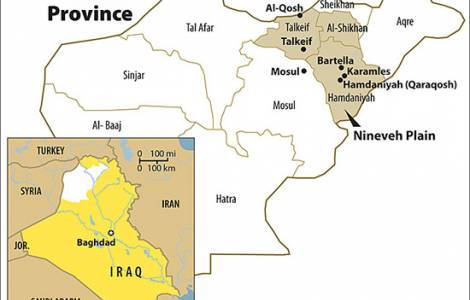
Wikipedia
Mosul (Agenzia Fides) - The preliminary phases to the military assault for the liberation of Mosul from jihadists of the Islamic State (Desh), sees the increase of political, geopolitical and sectarian disputes about the future political and ethno-religious structure of the region among the various actors in the field, after the possible defeat of the Caliphate.
For some time radio appeals are being launched to civilians in Mosul with the warning to stay away from the logistic bases of the jihadists and, if possible, to flee the city. But the more time passes, the more disagreements emerge between the political and military actors who should participate in the assault to remove Daesh’s stronghold in Iraq.
A clash over the future of Mosul and Nineveh province regard first of all the central government of Iraq and that of the Autonomous Region of Iraqi Kurdistan.
Nechirvan Barzani, Prime Minister of Iraqi Kurdistan, on Sunday October 9 explicitly warned that the future management of the freed area could have problems, if before there is no agreement between the government in Baghdad and the leadership of the Kurdish regional government, based in Erbil. "All political and religious components" added Barzani "should see their participation in the political process that will determine the future of the region guaranteed and how they will be governed ".
The United States, which support the anti-Daesh military coalition active in Iraq, have been involved for months in an attempt to defuse tensions between Erbil and Baghdad, with regard also to the future management of the oil resources of the region. Meanwhile, the government of the Autonomous Region of Iraqi Kurdistan tries to gain the consent of the Sunni tribal clans for the creation of an independent Kurdish state, which also includes Mosul and the Province of Nineveh and whose independence is proclaimed by referendum.
The political sectors which are opposed to the proclamation of an independent state in northern Iraq, led by Sunnis and inhabited mainly by Kurds and Sunnis are Shiite forces, social and most important religious component among those who support the government in Baghdad. The Iraqi national army is composed mainly of mililtary Shiites, which is flanked by Shiite militias, also backed by Iran.
The situation is further complicated by the presence on the ground of Turkish military forces. On Saturday, October 8, the Iraqi parliamentary Abdelaziz Hasan said that the offensive to conquer Mosul will not begin until the Turkish troops remain on Iraqi territory. But already at the beginning of October it was Turkish President Recep Tayyip Erdogan himself who entered in the complicated situation in Iraq, declaring that "Turkey, Saudi Arabia and Qatar will not allow sectarian domination" in the region, adding that Mosul will have to be controlled by "Sunni Arabs, Sunni Turkmen and Sunni Kurds".
In the open game on the future of the region, the various actors in the field seek to gain the support of Christians, fled en masse before the conquest of the region by militants of Daesh.
In July (see Fides 19/07/2016), Kurdish leader Masud Barzani, President of the Autonomous Region of Iraqi Kurdistan, during a meeting with Christian politicians held in Erbil had envisioned the creation of a "Christian state" in the Nineveh Plain, and the subsequent call for a referendum to allow the inhabitants of such an autonomous administrative entity to choose their own political framework under the rule of an independent Iraqi Kurdistan, rather than under the federal government based in Baghdad. (GV) (Agenzia Fides 10/10/2016)